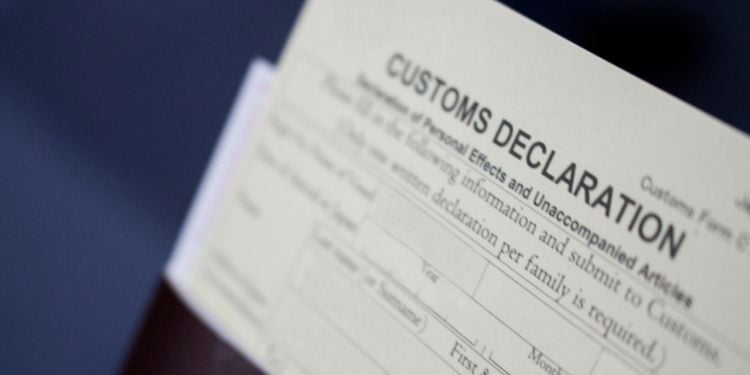Customs formalities in the United Kingdom

If you are planning your next move to the United Kingdom, seeking the correct information about customs formalities and all goods and products allowed into the UK from your home country is crucial. Custom regulations will make moving your belongings more manageable and convenient and reduce the risk of your goods being seized. Customs regulations include essential information about tax-exempt products and those strictly prohibited.
Customs regulations in the UK
All things that arrive from outside the UK via the post or a courier go through customs to be assessed before delivery. Suppose you are the recipient of items from abroad; you must pay VAT and customs duty or excise duty on the parcels received. This applies to new purchases, gifts, or used items such as your relocation belongings. VAT is charged on all goods except for presents worth £39 or less. Customs duty is charged on goods worth more than £135 regardless of whether you have bought or received them as a gift.
Good to know:
Royal Mail or the courier company will tell you how much VAT and duty you must pay (if any) to receive your goods. They will give you about three weeks to take care of the payment before returning the parcel to the sender.
Tip:
You can fill in the customs declaration form as long as the sender has specified on the customs declaration form: “goods to be declared by the importer”.
Customs for EU countries in the UK
Since the start of Brexit, the UK has been treated as a non-EU country, meaning that customs procedures and formalities apply to trade between the UK and the EU. To receive goods from outside the UK or export goods from the UK, you must file customs declarations and be asked for security and safety data, which helps border authorities assess the risk caused to their territory by goods entering or exiting their border.
Important:
For goods purchased online from outside the UK, recipients must expect to pay additional taxes and customs duty charges. The retailer should clearly state the extra charges, but if not, buyers have the right to contact the retailer and find out in advance to avoid unpleasant (and costly) surprises.
What can enter the UK?
When you enter the UK, you must be mindful of what you have packed in your luggage.
Liquid products
Regardless of the country you are travelling from, you cannot carry more than one litre of liquid products in your hand luggage. Containers must hold no more than 100 mL each and should fit into a small translucent plastic bag.
Live animals
Regulations for carrying live animals into the United Kingdom generally depend on the type of animal, your country of residence, or where you are travelling from. Failure to comply with existing regulations may lead to the deportation of your pet or its quarantine.
Foodstuff
You can bring food to the UK if travelling within the EU. However, there are some exceptions: find out more here. For those coming from outside the EU, travelling with meat, dairy food, or fish (including those that are not fresh or gutted) is prohibited.
Good to know:
Even after relocating to the UK, any goods coming from your home country will be subject to UK customs regulations.
Banned products in the UK
Below are some products you cannot bring to the UK regardless of the country you are coming from:
- illicit drugs;
- sharp weapons;
- self-defensive sprays;
- obscene material;
- counterfeit products.
Other products are allowed, provided you have importation permits. These include:
- firearms and ammunition;
- explosives;
- realistic imitation firearms;
- offensive weapons;
- real fur or related products;
- souvenirs made from endangered plants or animals;
- radio transmitters;
- rough diamonds.
Tax-exempt products in the UK
There are certain goods you can bring into the UK from abroad without paying tax as long as they are for your use or gifts for others, without an intention to sell them or make a profit. Anything that exceeds the allowance or is meant for sale must be declared and taxed:
- 42 litres of beer;
- 18 litres of wine (not sparkling).
And you can bring either:
- 4 litres of spirits and liquors over 22% alcohol;
- or 9 litres of sparkling wine.
If you are bringing tobacco, you can bring one from the following or a combination of, let's say, 100 cigarettes and 25 cigars:
- 200 cigarettes;
- 100 cigarillos;
- 50 cigars;
- 250 grams of tobacco.
Attention:
You are not allowed to combine alcohol and tobacco allowances.
Good to know:
You can make an online declaration within five days of arriving at the Great Britain port if you are carrying commercial goods that are below the £1,500 threshold, which are not restricted or weigh not more than 1,000kg.









